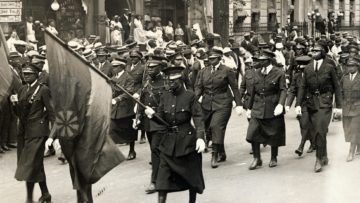Keisha Blain in The Atlantic:
 In the 20th-century U.S., black-nationalist women—individuals who advocated for black liberation, economic self-sufficiency, racial pride, unity, and political self-determination—emerged as key political leaders on the local, national, and even international levels. When most black women in the U.S. did not have access to the vote, these women boldly confronted the hypocrisy of white America, often drawing upon their knowledge of history. And they did so in public spaces—in mass community meetings, at local parks, and on sidewalks. These women harnessed the power of their voices, passion, and the raw authenticity of their political message to rally black people across the nation and the globe.
In the 20th-century U.S., black-nationalist women—individuals who advocated for black liberation, economic self-sufficiency, racial pride, unity, and political self-determination—emerged as key political leaders on the local, national, and even international levels. When most black women in the U.S. did not have access to the vote, these women boldly confronted the hypocrisy of white America, often drawing upon their knowledge of history. And they did so in public spaces—in mass community meetings, at local parks, and on sidewalks. These women harnessed the power of their voices, passion, and the raw authenticity of their political message to rally black people across the nation and the globe.
In the early 1920s, Amy Ashwood Garvey, a co-founder of the Universal Negro Improvement Association, advocated for the rights and freedom of black people while standing on crowded street corners in Harlem. Using these public spaces as platforms to advance her political agenda, Ashwood held nothing back, imploring black people to resist white supremacy in all of its forms. On several occasions, the activist publicly recited poetry, including Paul Laurence Dunbar’s famous work “We Wear the Mask,” which emphasized the strategies black people employed to survive segregation, oppression, and daily degradation.
More here. (Note: Throughout February, at least one post will be dedicated to Black History Month. The theme for 2023 is Black Resistance. Please send us anything you think is relevant for inclusion)
